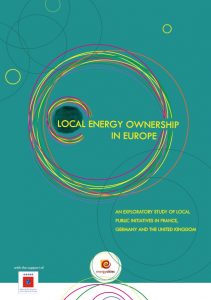Energy Cities launches pan-European study on remunicipalisation and local energy ownership
How can cities and communities reclaim control over local energy systems? What are the challenges and success factors for creating a local energy company? What are the links between devolution and remunicipalisation moves, community energy and participative governance?
To answer these and many other questions around the rise of local energy ownership across Europe, Energy Cities has commissioned a comprehensive scoping study which will be launched officially today during the EU Sustainable Energy Week.

In a session to be held today at 11:00 and titled: “Leading the Energy Transition: The different flavours of local energy communities and companies”, the author of the study Andreas Rüdinger will present the key findings of the study. Spanning three key European countries – Germany, The United Kingdom and France, the paper notably sheds light on the various conditions and triggering factors that have accelerated the development of energy remunicipalisation. In Germany for example, the renewal of over 20,000 concession contracts for managing electricity and gas distribution networks opened a window of opportunity, while the political momentum generated by the implementation of the Energiewende provided a favourable legal framework. In the UK, by contrast, remunicipalisation moves were more driven by social concerns linked to tackling energy poverty.
The reasons and opportunities that motivate local authorities to embark on remunicipalisation projects are multiple: revitalizing the local economy, creating a close connection with citizens, managing local public services in a more integrated way, fostering cooperation and partnerships with other players, accessing new markets, etc. However, as the study points out, these endeavours can also come with some risks, such as the competitive pressure exerted by the private sector and the limited influence over national and European energy policies.
A wide range of possible models exist for cities wishing to get active in the energy landscape. In Germany, local authorities most commonly act as integrated operators along the whole value chain (production, distribution, supply) and various sectors (energy, waste, water, transport, etc.). In France, cities are essentially involved as investment operators, providing also technical assistance to energy efficiency and renewable energy projects, while in the UK a lot of the recently created entities have become active as direct energy providers.
Download the press release

